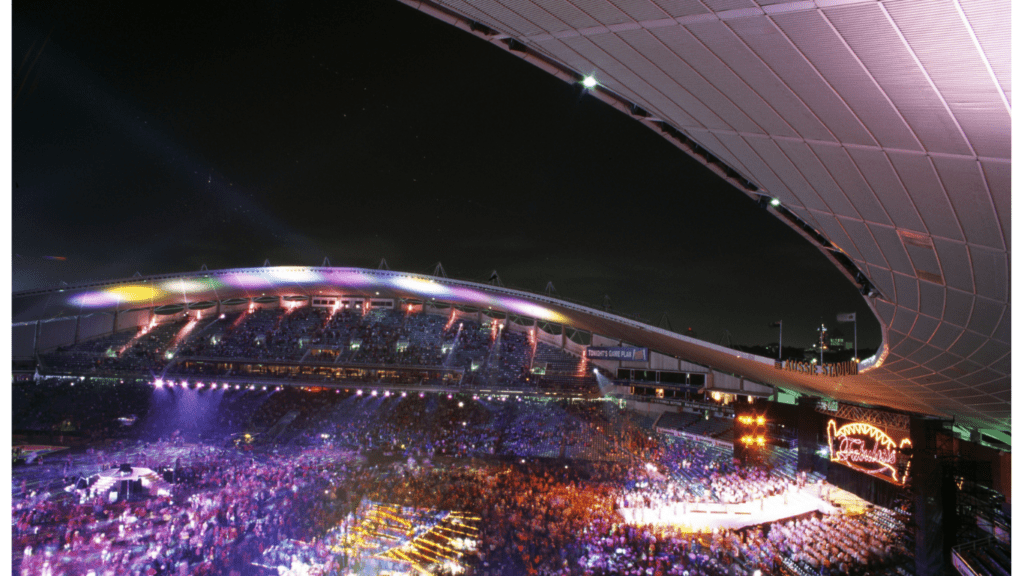Overview of Major Gaming Events and Conventions
Common Types of Gaming Events
Several types of gaming events contribute to the economic landscape.
Trade shows, such as:
- E3
- Gamescom
attract industry professionals, showcasing the latest innovations in gaming technology.
These events drive significant tourism, with visitors booking hotels, dining at local restaurants, and utilizing transportation services.
Consumer expos like PAX allow fans to engage directly with developers, creating community buzz and stimulating local economies.
Professional esports tournaments, including The International and League of Legends World Championship, draw massive audiences both onsite and online.
These events generate substantial revenue through ticket sales, sponsorships, and global media rights.
Local businesses benefit from the influx of attendees who spend on food, lodging, and entertainment.
Smaller regional conventions also play a vital role by providing platforms for indie developers to showcase their work, fostering innovation and economic diversity within the gaming industry.
Key Players in the Gaming Industry
Key players drive the success of major gaming events and conventions.
Game developers and publishers like Activision Blizzard, EA, and Ubisoft exhibit their latest titles, enticing media coverage and consumer interest.
Console manufacturers, including Sony, Microsoft, and Nintendo, often unveil new hardware and exclusive games, boosting market excitement and sales.
Esports organizations, such as Riot Games and Valve Corporation, host large-scale tournaments, attracting global viewership and investment.
Sponsorships from brands like Intel, Red Bull, and Logitech fuel these events, enhancing their scale and reach.
Streaming platforms like Twitch and YouTube Gaming provide coverage, monetizing through advertisements and subscriptions.
Local governments and tourism boards also play crucial roles by offering incentives and infrastructure support, making their cities attractive destinations for these events.
With their combined efforts, these stakeholders create a thriving ecosystem centered around gaming events and conventions.
Economic Significance of Gaming Events
- Revenue Generation from Tickets and Merchandise
Gaming events generate significant revenue from ticket sales and merchandise.
For instance, major conventions like E3 and Gamescom attract hundreds of thousands of attendees who purchase tickets, often in varying tiers ranging from general admission to exclusive VIP packages.
Merchandise sales, including branded apparel, gaming accessories, and exclusive collectibles, also contribute substantially to the revenue stream.
In 2019, E3 reported ticket sales of over 66,000 and Gamescom drew more than 370,000 visitors, showcasing the economic impact of such large-scale gatherings. - Impact on Local Businesses and Employment
Local businesses experience a boost in sales during major gaming events.
Hotels, restaurants, and local retailers benefit from the influx of visitors, often seeing significant increases in revenue.
According to the Los Angeles Tourism & Convention Board, events like E3 generate millions in direct spending for the city.
Additionally, these events create temporary and permanent jobs.
From event staff to marketing professionals, diverse roles are filled to ensure the success of these conventions.
For example, the Austin Convention Center noted a surge in hospitality jobs during the annual PAX South event, illustrating the positive economic impact on local employment.
Case Studies: Successful Gaming Conventions

Example 1: The Economic Success of E3
E3 has consistently demonstrated significant economic impact on the host city, Los Angeles. According to the Entertainment Software Association (ESA), E3 2019 generated over $75 million in economic activity.
And because of this:
- this event attracted 66,100 attendees
- boosting local spending on accommodations
- dining
- and transportation
Los Angeles’ tourism sector benefited significantly as international visitors often extended their stay, exploring notable landmarks and cultural sites.
Local businesses experienced substantial revenue surges during E3. For instance, downtown hotels reported near-full occupancy rates, with average daily rates increasing.
Restaurants adapted by offering E3-themed menus and specials, driving higher foot traffic. Exhibit vendors also saw an increase in sales, as attendees purchased exclusive merchandise and promotional items.
Example 2: PAX and Its Regional Economic Contributions
PAX (Penny Arcade Expo) also showcases how gaming conventions contribute to regional economies.
PAX East, held in Boston, is a prime example. In 2020, PAX East attracted over 130,000 attendees, generating significant economic benefits for the city.
The Massachusetts Convention Center Authority reported that PAX East contributed approximately $55 million to the local economy.
Local hospitality and food service industries experienced considerable boosts. Hotels in the vicinity of the convention center reported high occupancy rates, while local eateries saw increased patronage.
Additionally, PAX East’s influence extended beyond Boston, drawing visitors to neighboring towns, spreading economic benefits regionally.
PAX South, held in San Antonio, provided similar economic advantages.
In 2019, it drew around 32,000 attendees, injecting an estimated $20 million into the local economy.
Local businesses, including hotels, restaurants, and retail vendors, saw an upturn in sales, driven by the influx of gamers and exhibitors.
These case studies underline the substantial economic impact gaming conventions have on host cities and regions, highlighting their role in driving local economic growth and supporting job creation.
Challenges and Opportunities
Logistics and Cost Management Challenges
Major gaming events present significant logistics and cost management challenges. Coordinators must address venue selection, accommodating thousands of attendees, and transportation.
For instance, E3 in Los Angeles requires securing the Convention Center, arranging surrounding hotels, and planning for traffic congestion. Furthermore, costs can skyrocket with expenses for security, equipment rentals, and staffing.
According to Event Manager Blog, event security alone can comprise up to 30% of the total budget.
Organizers must balance these expenses against projected revenues to ensure financial viability. Efficient planning and resource allocation become critical to managing these complexities.
Opportunities for Future Growth and Expansion
Despite challenges, significant opportunities exist for growth and expansion in major gaming events.
Emerging markets, such as Southeast Asia and Latin America, show increased interest in gaming conventions.
I’ve observed industry reports indicating rising attendance numbers and sponsorship opportunities in these regions.
Additionally, incorporating digital elements, like virtual attendance and eSports tournaments, can attract a global audience.
By diversifying content and reaching new demographics, organizers can foster sustained growth.
Partnerships with local governments and businesses can also bolster resources, providing a platform for further expansion.


 Charlie Bracegirdle seamlessly combines his passion for gaming with his role at Infinity Game Saga, where he is both a dedicated gamer and a prominent content creator. As an integral member of the team, Charlie brings a wealth of experience and a deep understanding of the gaming industry to his work. His articles and content cover a broad spectrum of gaming topics, from detailed reviews and insightful industry analyses to the latest trends and upcoming releases.
Charlie’s unique perspective, shaped by his own extensive gaming experiences, allows him to engage with readers in a meaningful way. His writing not only informs but also entertains, providing a blend of professional insight and personal enthusiasm. Whether he's exploring new game mechanics, dissecting game strategies, or sharing his thoughts on the future of gaming, Charlie's contributions make a significant impact on the Infinity Game Saga community. Through his work, he bridges the gap between gamers and the evolving landscape of the gaming world, enhancing the experience for all who follow his updates and analyses.
Charlie Bracegirdle seamlessly combines his passion for gaming with his role at Infinity Game Saga, where he is both a dedicated gamer and a prominent content creator. As an integral member of the team, Charlie brings a wealth of experience and a deep understanding of the gaming industry to his work. His articles and content cover a broad spectrum of gaming topics, from detailed reviews and insightful industry analyses to the latest trends and upcoming releases.
Charlie’s unique perspective, shaped by his own extensive gaming experiences, allows him to engage with readers in a meaningful way. His writing not only informs but also entertains, providing a blend of professional insight and personal enthusiasm. Whether he's exploring new game mechanics, dissecting game strategies, or sharing his thoughts on the future of gaming, Charlie's contributions make a significant impact on the Infinity Game Saga community. Through his work, he bridges the gap between gamers and the evolving landscape of the gaming world, enhancing the experience for all who follow his updates and analyses.
